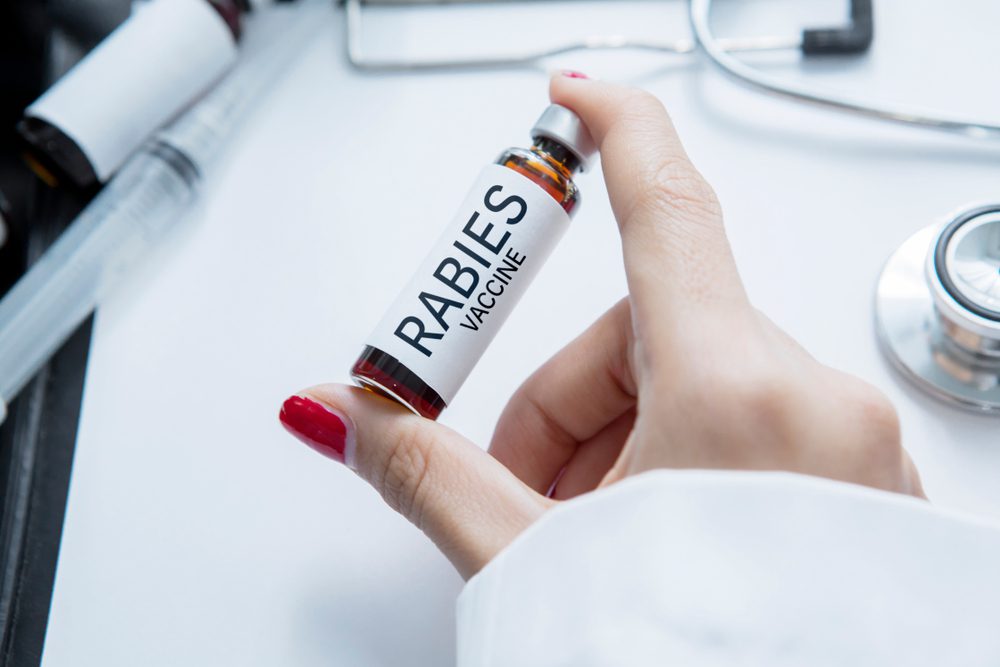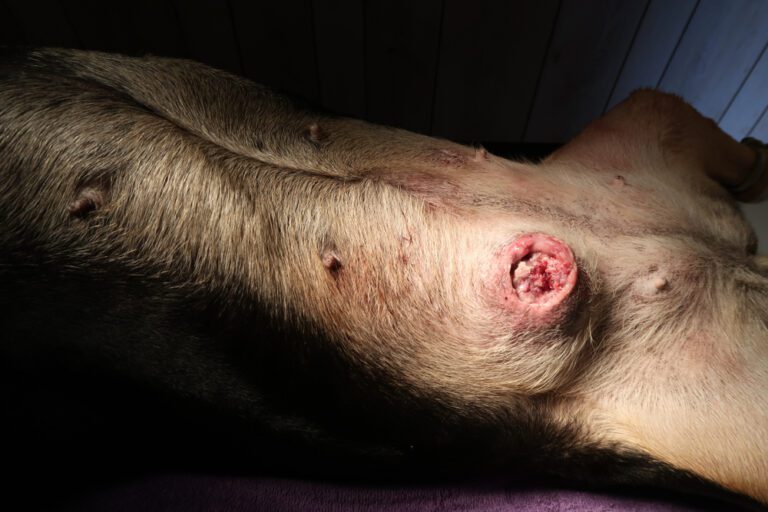Does Shih Tzu Have Rabies: 8 Symptoms & Best Preventions
As a Shih Tzu owner, staying informed about the potential health risks and diseases your furry friend may be susceptible to is crucial. One of these diseases is rabies, a severe viral infection that can be fatal if left untreated. While rabies can affect dogs of any breed, it is essential to understand the risks and take steps to protect your Shih Tzu from this potentially deadly disease.
So, does Shih Tzu have rabies? The answer is that any dog, including a Shih Tzu, can contract rabies if exposed to an infected animal.
Let’s examine what you need to know about this potentially deadly virus and how to protect your pup. Stay informed and take preventive measures; you can help protect your Shih Tzu from rabies and other serious diseases.
What is Rabies?
Rabies is a viral disease that affects the central nervous system of mammals and can be transmitted through contact with saliva or other bodily fluids. It is most commonly spread by bites or scratches from infected animals such as dogs, cats, bats, raccoons, skunks, and foxes.
What are the Stages of Rabies?
Rabies typically progresses through several stages in humans and animals. These stages can vary in duration and may not always be present in every case.
-
Prodrome: This is the initial stage of rabies and may last several days to a week. The infected person or animal may experience fever, headache, and general discomfort during this stage.
-
Acute neurologic phase: This is the most severe phase of rabies and is characterized by symptoms such as confusion, hallucinations, and paralysis. The infected person or animal may also experience difficulty swallowing and excessive salivation.
-
Coma: In this stage, the infected person or animal may slip into a coma as the disease progresses.
-
Death: If left untreated, rabies is almost always fatal.
It is essential to seek medical attention as soon as possible if you suspect that you or your pet may have been exposed to rabies. Early treatment can help prevent the disease from progressing and may be lifesaving.
Does Shih Tzu have Rabies?

Shih Tzus are just as susceptible to rabies as any other dog breed due to their mammalian nature. However, due to the size difference between them and larger breeds like German Shepherds or Great Danes, they are less likely to come into contact with rabid animals such as bats or raccoons. It does not mean they cannot contract rabies; they only have a lower risk than large breeds.
That being said, it’s still essential for all pet owners – even those with smaller dogs like Shih Tzus – to vaccinate their pets against rabies to protect them from this potentially fatal virus.
Signs and Symptoms of Rabies in Shih Tzus
Symptoms of rabies include fever, weakness in muscles, confusion, hallucinations, aggressive behavior, paralysis, and more. If left untreated, it can be fatal for humans and animals alike.
1. Fever
If your Shih Tzu seems warmer than usual and is a bit lazy, it might be a fever. A fever is the body’s way of saying it’s fighting off something terrible, like the rabies virus. Think of it as your dog’s internal alarm system going off.
2. Weakness in Muscles
Muscle weakness is a severe symptom of rabies in Shih Tzus, and it can be fatal if left untreated. It sounds daunting, but by being aware of the symptoms as soon as possible, owners can help prevent their pups from contracting the virus. It’s not uncommon for dogs to exhibit signs of weakness before the onset of rabies in other species does occur.
Generally, weakness indicates something is wrong with the pup, and owners should seek veterinary help immediately if they suspect their dog has rabies or another problem.
3. Confusion
Confusion is one of the tell-tale signs of rabies in a Shih Tzu, yet does your pup have it? Rabies is a hazardous viral infection that can be highly fatal to the Shih Tzu and humans. It is essential to take notice of any odd behavior changes in your pup, such as confusion and restlessness, so you can catch and treat it quickly, should they develop the virus.
Even though there is an effective vaccine for rabies, immediate treatment with specific medications is needed as soon as symptoms arise to increase the chances of survival by a considerable amount.
4. Hallucinations
Rabies can cause dogs to see or react to things that aren’t there. If your Shih Tzu is barking at empty corners or chasing invisible friends, it might not be just a quirky habit. It’s a sign their brain is sending them false signals.
5. Aggressive behavior
Aggressive behavior can be one of the first rabies warnings in Shih Tzus. Pet owners must familiarize themselves with the signs and symptoms to catch the disease early on and safeguard against potentially fatal consequences. If you notice your pup showing increased aggression, it does not necessarily mean they have rabies; however, you should always visit a veterinarian for an examination.
6. Paralysis
One of the most heartbreaking symptoms is paralysis, significantly if they can’t move their legs or wag their tail. It’s as if their body is stuck, and they can’t tell it what to do anymore.
7. Seizures
Frequent or uncontrolled seizures are another alarming sign of rabies in this canine breed. It is essential to recognize if your Shih Tzu does have rabies, as an immediate and appropriate response to the virus is essential. It includes keeping infected pets isolated from other animals and humans and swiftly seeking medical attention for a diagnosis and treatment plan. Awareness of the signs and symptoms can help protect you, your pet, and your family from the potential dangers of rabies.
8. Excessive drooling
Excessive drooling is often one of the most visible symptoms of rabies in Shih Tzus, but it does not necessarily mean that the dog does indeed have rabies. If you suspect that your Shih Tzu has rabies or has recently had contact with an infected animal, speak to your veterinarian about possible next steps for diagnosing and treating the condition.
Furthermore, take all necessary steps to protect other pets and humans that may have come into contact with your pet. Timely diagnosis and treatment are essential for keeping you, your pet, and others safe.
How Can I Protect My Shih Tzu From Rabies?
You can protect your Shih Tzu from rabies by following these tips:
1. Get Your Shih Tzu Vaccinated

The best way to protect your Shih Tzu from rabies is to ensure they are up-to-date on their vaccinations. All dogs should be vaccinated against rabies, and booster shots are typically required every one to three years. If you are unsure whether or not your Shih Tzu is up-to-date on its vaccinations, don’t hesitate to contact your veterinarian.
2. Avoid Wild Animals
You should also avoid contact with wild animals, as they are the most likely to be infected with rabies. If you see a wild animal acting strangely, do not approach it and contact your local animal control agency immediately. Keeping your Shih Tzu on a leash outdoors is also essential, as this will help prevent them from coming into contact with wild animals.
3. Contact Your Veterinarian
If another animal bites your Shih Tzu, it is essential to contact your veterinarian immediately. They will need to determine if the animal that bit your dog was vaccinated against rabies and whether or not your dog will need to be vaccinated. Sometimes, your veterinarian may recommend that your Shih Tzu be euthanized if it cannot be disease-free.
4. Watch for Signs of Rabies in Your Shih Tzu
Several signs may indicate that your Shih Tzu has rabies, including fever, paralysis, seizures, and excessive drooling. If you notice any of these signs, contact your veterinarian immediately so they can begin treatment. Unfortunately, there is no cure for rabies once symptoms have begun, so it is crucial to catch it early.
5. Keep Your Property Free of Food Attractants
One way to help prevent wild animals from entering your property is to keep food attractants off your property. It includes garbage cans, pet food bowls, and bird feeders. Maintaining these items off your property will make it less likely for wild animals to come onto your property and potentially infect your Shih Tzu with rabies.
Conclusion
Rabies is a severe viral infection that can lead to death if left untreated; however, this doesn’t mean it’s something you necessarily have to worry about every day when owning a pet – especially one as small as a Shih Tzu. By vaccinating regularly and monitoring them in public areas, you should give yourself peace of mind, knowing you’re doing everything possible to keep your pet safe from this dangerous virus. Share this article with other Shih Tzu owners if you find it valuable. Remember – prevention goes much further than cure!
FAQ’s
Can an average Shih Tzu dog have rabies?
Any dog, including a Shih Tzu, can contract rabies if exposed to an infected animal. It is essential to take preventive measures to protect your Shih Tzu from rabies and seek medical attention if you suspect they may have been exposed. Early treatment can help prevent the disease from progressing and may be lifesaving.
Can Shih Tzu dogs spread rabies without biting?
Rabies is typically transmitted through bites or saliva from an infected animal. However, the virus can be spread through other means, such as if saliva from an infected animal comes into contact with a person or animal’s mucous membranes (such as the eyes, nose, or mouth) or an open wound. It is essential to take preventive measures to protect yourself and your pets from rabies and seek medical attention if you suspect you or your pet may have been exposed.
How long can a Shih Tzu dog live with rabies?
If left untreated, rabies is almost always fatal. Once symptoms of rabies appear, the disease progresses rapidly, and death usually occurs within a few days. It is essential to seek medical attention as soon as possible if you suspect that you or your pet may have been exposed to rabies. Early treatment can help prevent the disease from progressing and may be lifesaving.
Can a small bite cause rabies?
Yes, a small bite can cause rabies if it is from an infected animal and the virus is transmitted through the bite. It is essential to seek medical attention and possibly receive treatment to prevent the development of rabies.







